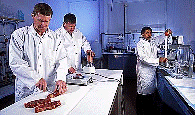United States Department of Agriculture: Agricultural Research Service, Lincoln, Nebraska

Roman L. Hruska U.S. Meat Animal Research Center: Reports
Date of this Version
2011
Document Type
Article
Citation
International Scholarly Research Network
ISRN Renewable Energy
Volume 2012, Article ID 723829, 5 pages
doi:10.5402/2012/723829
Abstract
Selective harvesting of manure can benefit cattle producers by creating a product of value. A tool that identifies locations of manure accumulation has been developed using a subsurface sensor (Dualem-1S, Milton, ON) and software designed for salt mapping (ESAP, Riverside, CA). The combination allowed the development of models to estimate higher heating value (HHV) of feedlot manure across a feedlot pen. Soil sample data from cattle feedlots in Texas and Nebraska were analyzed for volatile solids (VSs) then combined with the Dualem-1S apparent soil conductivity (ECa) data to produce models having correlations between associated ECa values and VS (r2 = 0.869, VS). A corresponding model is under development to estimate the moisture content of the collectable solids. The combined models allow real-time spatial estimates of HHV within a feedlot pen. These methods will allow direct harvesting of VS for use as a recoverable energy source through direct combustion or cocombustion.


Comments
Copyright © 2012 Roger A. Eigenberg et al. This is an open access article distributed under the Creative Commons Attribution License